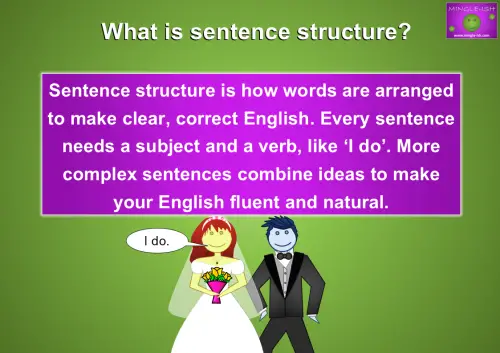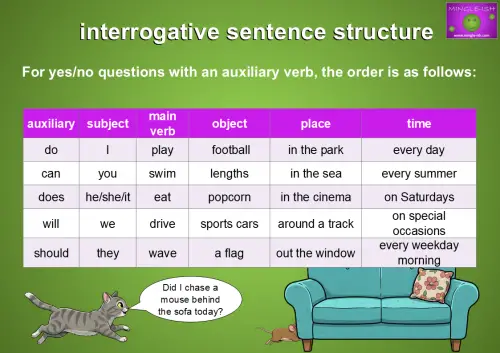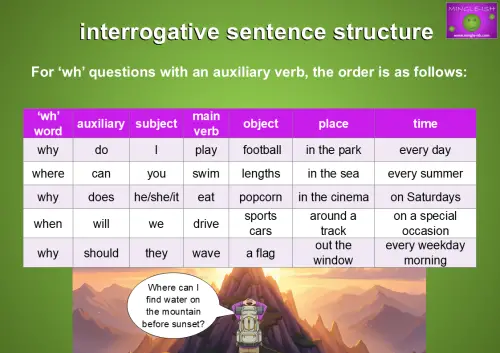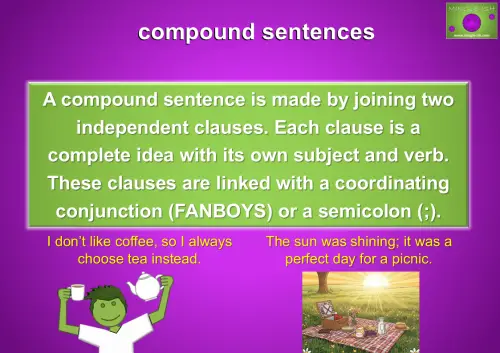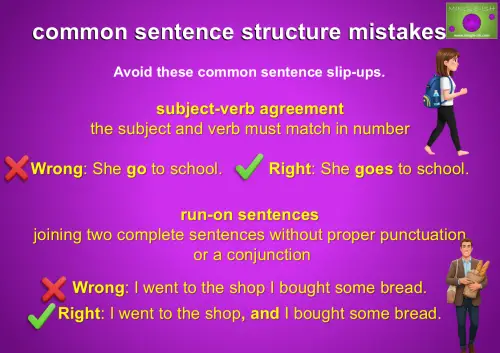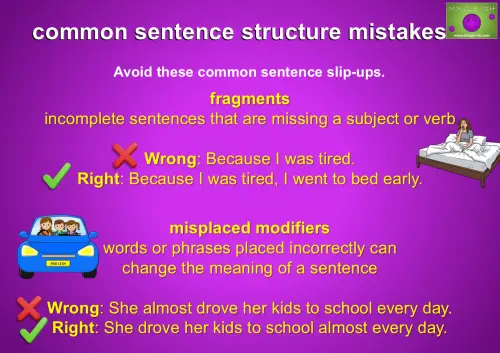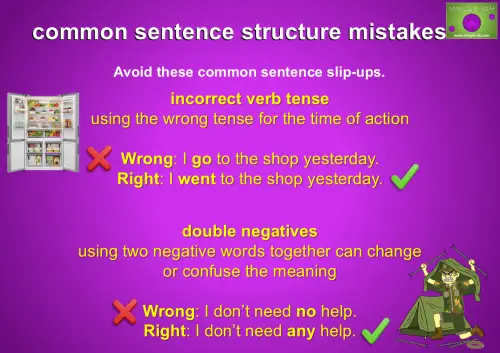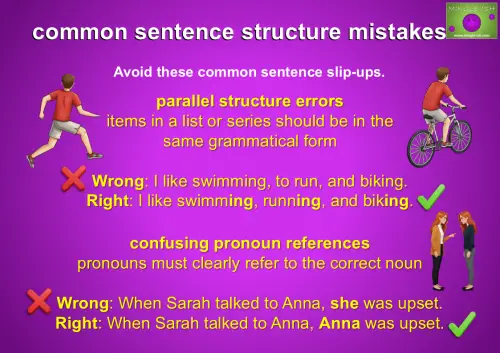Contents
Master English sentence structure and improve your grammar, writing, and speaking skills. This guide for ESL and EFL learners covers sentence types, word order, common mistakes, and tips to write clear, natural, and fluent English. Perfect for anyone looking to boost their English confidence and communication.
What is sentence structure?
Sentence structure is the way words, phrases, and clauses are arranged to form clear, correct, and natural English sentences. Understanding sentence structure is essential for improving grammar, writing, and speaking skills. For ESL and EFL learners, knowing how to build sentences correctly helps you communicate confidently and avoid common mistakes.
At its simplest, a sentence must contain a subject and a verb. For example: ‘I do’. Here, ‘I’ is the subject and ‘do’ is the verb. This is a complete, correct sentence, but English sentences can also be much more complex. By learning sentence structure, you’ll be able to form longer sentences, combine ideas, and express yourself clearly in both writing and conversation.
Types of English Sentences
English sentences come in different types depending on how ideas are connected. Understanding simple, compound, complex, and compound-complex sentences helps you write and speak clearly, express ideas fully, and improve your grammar and fluency.
simple sentence structure – active voice
Let’s start with an easy structure. The active voice is when someone does something – the subject performs an action. It’s used far more often than the passive voice. What’s the passive voice, you ask? Follow the link to find out, but be warned, it’s not quite as straightforward!
Now, let’s look at the active voice structure and see some examples.
The simple structure of the active voice in English is:
Subject + Verb + Object
- Subject: the person or thing doing the action
- Verb: the action being performed
- Object: the person or thing receiving the action (if there is one)
Examples:
- I play football. → I = subject, play = verb, football = object
- She eats popcorn. → She = subject, eats = verb, popcorn = object
- We drive sports cars. → We = subject, drive = verb, sports cars = object
It’s called “active” because the subject performs the action rather than receiving it (which would be passive voice).
HOT TIP: The verb you use determines the tense of the sentence; it can be past, present, or future. There are 13 different tense structures to learn. If you don’t know them yet, I suggest starting with the present simple tense.
Subject + Verb + Object + Place and Time
Subject + Verb + Object is the basic sentence structure. We can make it a little more complex by adding time and place.
As you can see, place always goes after the object, while time can go either at the beginning or the end of a sentence.
interrogative sentence structure
Interrogative sentences often begin with the ‘wh’ words – who, what, when, where, why, and how. These are a little trickier because they include auxiliary verbs.
Take a look at the structure for questions, and remember – never swap the subject and the auxiliary incorrectly
Yes/No questions with an auxiliary verb
Structure: auxiliary verb + subject + main verb + the rest of the sentence
This is used when the sentence needs an auxiliary verb such as do, does, did, can, will, have, or should.
Examples:
- Do you like chocolate?
- Can she swim?
wh- questions with an auxiliary verb
Structure: wh-word + auxiliary verb + subject + main verb + the rest of the sentence
Use this when asking for specific information and the sentence requires an auxiliary verb.
Examples:
- Why did they leave early?
- Where will you stay?
compound sentences
A compound sentence is made by joining two independent clauses. Each clause is a complete idea with its own subject and verb. These clauses are linked with a coordinating conjunction such as for, and, nor, but, or, yet, so (the FANBOYS). Using this structure helps you connect equal ideas and avoid short, choppy sentences.
Structure: Independent Clause + Coordinating Conjunction + Independent Clause
Examples:
- I wanted to go for a walk, but it started raining.
- She finished her homework, and she watched a film afterwards.
- I don’t like coffee, so I always choose tea instead.
- He studied all week, yet he still felt unprepared for the test.
- You can take the bus, or you can walk if you prefer.
You can also create a compound sentence with a semicolon when the ideas are closely connected.
Structure: Independent Clause + ; + Independent Clause
Examples:
- I was running late; the traffic was awful this morning.
- She loves reading; her favourite books are mysteries.
- We planned to visit the museum; it closed earlier than we expected.
- He cooked dinner; I washed the dishes.
- The sun was shining; it was a perfect day for a picnic.
complex sentences
A complex sentence is a sentence that contains one independent clause (a complete sentence) and at least one dependent clause (a group of words that has a subject and verb but cannot stand alone).
The dependent clause usually begins with a subordinating conjunction such as because, although, if, when, since, while, or unless.
Structure:
Independent Clause + Dependent Clause
Examples:
- I went to bed early because I was exhausted.
- She cancelled the trip since the weather was terrible.
- We stayed inside while the storm passed.
- He took an umbrella because it looked like rain.
- They left early although they wanted to stay longer.
Structure:
Dependent Clause + , + Independent Clause
Examples:
- Although it was raining, we still went for a walk.
- When the film finished, everyone clapped.
- Because he was running late, he skipped breakfast.
- If you need help, just let me know.
- While she was cooking, the phone rang.
Common Sentence Structure Mistakes
Ah, English… lovely language, tricky rules. Even native speakers trip over sentence structure sometimes. If you’re learning English, watch out for these classic mistakes: subject-verb agreement, run-ons, fragments, and a few sneaky others. Let’s take a look.
- Subject-verb agreement – when your subject and verb aren’t on speaking terms.
Wrong: She go to school.
Right: She goes to school. - Run-on sentences – because sometimes one sentence just isn’t enough… but joining them willy-nilly confuses everyone.
Wrong: I went to the shop I bought some bread.
Right: I went to the shop, and I bought some bread.
- Fragments – incomplete sentences that feel like half a sandwich.
Wrong: Because I was tired.
Right: Because I was tired, I went to bed early. - Misplaced modifiers – words in the wrong spot can make your sentence say something entirely different.
Wrong: She almost drove her kids to school every day.
Right: She drove her kids to school almost every day.
- Incorrect verb tense – don’t let your past, present, and future have an awkward family reunion.
Wrong: I go to the shop yesterday.
Right: I went to the shop yesterday. - Double negatives – saying “no” twice just makes your meaning disappear.
Wrong: I don’t need no help.
Right: I don’t need any help.
- Parallel structure errors – lists should march in formation, not stumble around.
Wrong: I like swimming, to run, and biking.
Right: I like swimming, running, and biking. - Confusing pronoun references – be clear who “he,” “she,” or “they” actually means, or chaos ensues.
Wrong: When Sarah talked to Anna, she was upset.
Right: When Sarah talked to Anna, Anna was upset.
Spot these mistakes and you’ll be writing clearer, smarter, and slightly more magical sentences in no time.
Tips to Improve Your Sentence Structure
Improving your sentence structure doesn’t have to be complicated. With a few simple habits, you can make your writing clearer, smoother, and easier to understand. Here are quick, practical tips ESL and EFL learners can use every day to build better sentences.
- Start with simple sentences
Make sure each sentence has a clear subject and verb before adding extra details. - Use linking words
Words like and, but, so, because, although, and when help you connect ideas smoothly. - Avoid overly long sentences
If a sentence feels too long or confusing, split it into two shorter ones. - Check for fragments and run-ons
Every sentence must be complete, and long sentences need proper punctuation. - Read your sentence aloud
If it sounds strange or difficult to follow, it probably needs adjusting. - Use consistent verb tenses
Keep your timing clear by sticking to the same tense within each sentence. - Practise with models
Look at well-written examples and try to copy their structure with your own ideas. - Keep your word order clear
Most English sentences follow Subject + Verb + Object, so stick to this pattern when in doubt. - Use pronouns carefully
Make sure it’s clear who he, she, it, or they refers to. - Limit your use of commas
Only use them when needed. Too many can make a sentence feel messy. - Watch your modifiers
Place describing words close to the word they describe to avoid confusion. - Vary your sentence types
Mix simple, compound, and complex sentences to make your writing more interesting. - Expand your vocabulary
Using more precise words can make your sentences clearer and more natural. - Check for parallel structure
In lists or paired ideas, keep the grammar pattern the same for an easy-to-read flow. - Practise rewriting
Take a short, simple sentence and rewrite it as a compound or complex sentence.
Why Sentence Structure Matters in English
Sentence structure is basically the skeleton of your English. If you understand how sentences are built, you can improve English grammar without wanting to cry into a biscuit. It helps you write clearer, speak smoother and avoid those random grammar slips that make you think, why did I just say that.
For ESL and EFL learners, knowing simple, compound and complex sentences is like unlocking a secret level. Your writing gets tidier, your ideas make more sense and you sound a lot more confident. It is one of the easiest wins for English fluency, so it is definitely worth learning.
Sentence Structure Quizzes
Have a go at these sentence structure quizzes and see if your words behave themselves or wander off in completely the wrong order.
Conclusion: Master English Sentence Structure
Once you get the hang of English sentence structure, everything else feels a lot easier. Your writing looks cleaner, your grammar makes more sense and you start sounding like you actually know what you are doing. It is a simple way to level up your English without the stress.
If you want to keep learning, have a nose around the other grammar pages and pick up even more tricks. And if you fancy a bit of extra practice, my YouTube channel is packed with quick lessons, quizzes and English sentence practice made for ESL and EFL learners.
